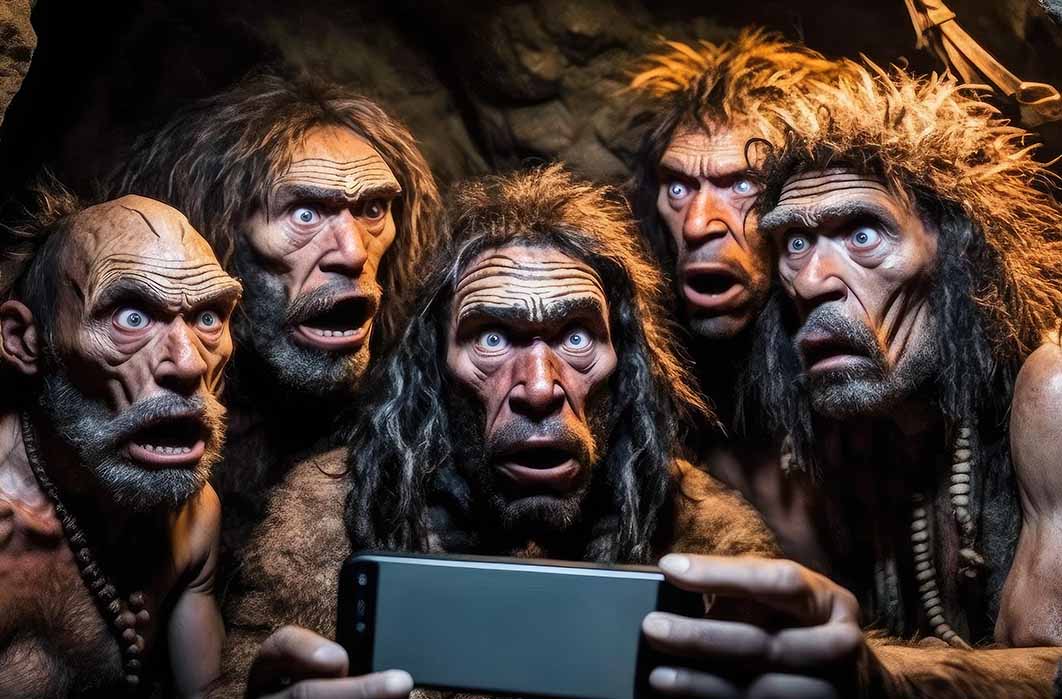
Collective Learning: So Easy, Even A Caveman Could Do It
Ever since Darwin brought up the fact that the human race had apes as distant ancestors, modern humans have been uneasy and a little defensive. They mocked the simian nature of Australopithecus, jeered at the brow-ridges and stocky frame of the Neanderthals and the less said about Homo erectus around an adolescent boy, the better. As far as relatives go, these ‘apemen’ are the embarrassing cousins modern humans would rather not acknowledge.
However, it is very wrong to write off these forebears as dull brutes who lived short and squalid lives, even though that is how they have been characterized for many years. More recently, this idea has been rejected by some modern scholars who tend to view hunter-gatherer lifestyles as idyllic, with loads of free time, and an excellent diet. Both extremes miss the mark: These ancestors were neither mindless brutes nor noble savages. They were a little of both. Most of all, they were trailblazers who began the process of collective learning.

They were not dumb brutes, at least not all of them (Agustin/ Adobe Stock)
Unfortunately, popular culture has done its bit to undermine general respect for man’s hominid forebears. In a meme made famous by 1950s cartoons, cavemen with names like Grog and Ugg sporting unkempt mullets and fetching off-the-shoulder animal skins, fight off a T. Rex with stone-tipped spears. This image is amusing and about as anachronistic as it gets. At least 65 million years separate from any form of prehistoric human from encountering any form of dinosaur.
Another well-known trope is the caveman ‘seducing’ his intended mate with a club, then dragging her senseless body back to his cave by the hair. This is a deeply troubling image in this day and age (as it should have been in any day and age). These depictions fueled the perception that early hominids were clumsy and slow-witted. Admittedly, there is some validity to that view. For a start, Australopithecines were not skilled conversationalists. Experts believe they were about as vocal as the modern chimpanzee. But that does not mean Australopithecines could not be inventive. Stone implements still exist from at least 3.3 million years ago. There is also evidence that they were teaching each other how to make these tools. Researchers suggest that behavioral changes in Australopithecus afarensis associated with the development of stone-age tech, may have, over eons, driven emergence of the Homo genus. However, an Australopithecus at a dinner party would be more likely to throw its feces at the guests than engage in witty repartee. Of course, it is unlikely that such a theoretical dinner party would have been any more successful with a Neanderthal guest of honor. One of these hulking guys would have probably hit the bottle, and the damage a drunk, powerful Neanderthal could wreak defies imagination.

Neanderthal might not have been the ideal dinner guest (Gorodenkoff/ Adobe Stock)
For many years, Paleoanthropologists believed Neanderthals were just too stupid and ungainly to use and make efficient tools or cooperate to hunt megafauna. However, recent discoveries bring into question the idea that Neanderthals were stone-age Homer Simpsons. It is now theorized they created art, cared for their elderly, and possibly even invented language, which despite all the stone tools, was probably the killer app of early humans.
Language the Game Changer
Language was a game-changer: There is no more direct way to impart information than through verbal communication, and information was crucial for humanity’s development. It permitted individuals to make better, more informed choices. Language allowed a single member of a tribe to tell the group about the availability of food, the location of predators, or other conditions vital to collective survival. The development of true language was a significant evolutionary advantage. The reasons for this are many, but principally, speech allows the retention and dissemination of information without the constant need for reinvention.




